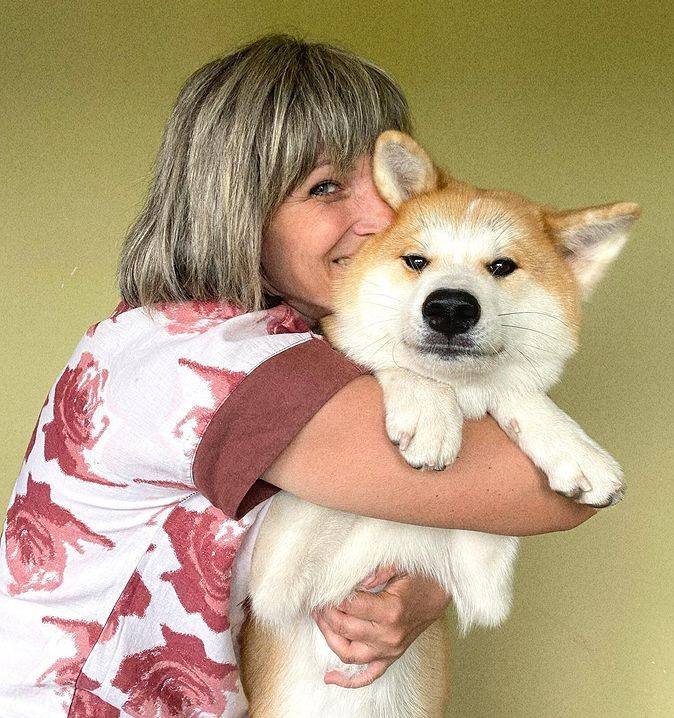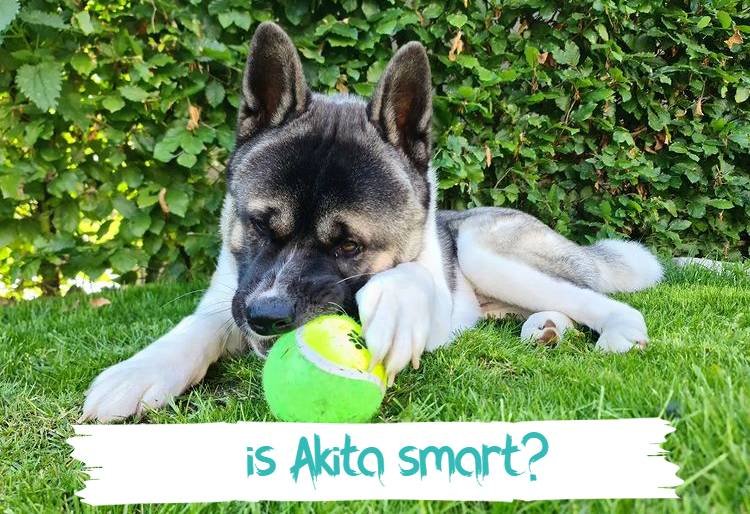Akita owners are often curious about their dog’s intelligence. After all, these furry friends are known for being loyal and protective. So, how smart are Akitas?
I have owned two Akitas and can attest to their loyalty and protective nature. My first Akita, Hachiko, was particularly attached to me and would follow me around the house. He was also very good at obeying commands and learning tricks. My second Akita, Dakota, was a bit more independent but no less intelligent. She was very quick to learn new things and excelled at agility training.
So, how smart are Akitas? According to intelligence expert Stanley Coren’s studies, Akitas rank 54th out of 79 on his list of smartest dog breeds. This places them in the “average” category when it comes to intelligence. However, it is important to keep in mind that intelligence is not the only factor that determines a dog’s Trainability.
According to the Canine Psychologist, “There are three types of intelligence in dogs: instinctive (what they’re born with), adaptive (learning from experience), and working and obedience (learning from humans).”
Akitas And Their Intelligence

Let’s take a closer look at the intelligence of Akitas and how they stack up in each category.
Instinctive Intelligence: Akitas are natural guardians and have a strong prey drive. They are also quick to defend their territory. This high level of instinctive intelligence makes them easy to train for guard and protection work.
Adaptive Intelligence: Akitas are quick learners and have good memories. This allows them to quickly adapt to new situations and learn from their experiences.
Working and Obedience Intelligence: Akitas are typically obedient and responsive to training. They are also known for being stubborn and headstrong, which can make them challenging to train. However, Akitas are generally willing to please their owners and will respond well to positive reinforcement.
According to an article published on ScienceAlert, Akita’s are considered the Fourth tier in the rankings of smartest dogs. They are considered to be “somewhat trainable” which is a testament to their working and obedience intelligence. The article cites a study conducted by Stanley Coren in the ’90s and he found that “Akita falls in the Fourth tier – They tend to learn a new trick in 25 to 40 repetitions and obey at least 50 percent of the time.“
Why Are Akitas Considered Intelligent?

Akitas are considered intelligent for several reasons.
- One reason is that they are quick learners and can remember commands and tricks easily.
- Another reason is that they are very good at problem-solving.
- Akitas have also been known to be very independent thinkers, which is another sign of intelligence.
What is the best way to test Akita’s IQ?
You can find many different intelligence tests for dogs online but It is important to remember that no test is 100% accurate and that your dog’s score may not be indicative of their true intelligence.
You can also try some simple at-home tests such as:
Test 1. How to get a treat that is out of reach
Place a treat on the floor just out of your Akita’s reach. If they can figure out why they need treatment, they are likely intelligent.
Test 2. Scent test
This test involves placing a piece of food under one of three cups and then letting your Akita sniff the cups. If they can choose the cup with the food, they are likely intelligent.
The Various Ways In Which Akitas Show Their Intelligence:
One of the most impressive things about Akitas is its high level of intelligence. They can understand and communicate with humans better than most other dog breeds. This makes them excellent companions and loyal protectors. Akitas are also quick learners and can be trained to perform a variety of tasks.
An Akita’s intelligence can be demonstrated in a number of ways.
Human Body Language Readability: One is their ability to read human body language. Akitas are very good at understanding nonverbal cues from humans. This allows them to respond appropriately in various situations. For example, an Akita may sit down when a human points to the ground, indicating that the person wants the dog to stay put.

Display of Facial Expressions: The use of facial expressions is another method by which Akitas express their intelligence. Akitas are excellent at communicating their emotions through facial For instance, an Akita may give a “smiling” expression when it is happy or exciting. This type of communication is often used to build rapport between an Akita and its human companion.
Problem Solving Capability: Akitas also show their intelligence through their problem-solving abilities. Akitas are often quick to find solutions to problems. For example, if an Akita is presented with a puzzle, it will likely figure out how to solve it quickly. This ability to think creatively is one of the things that make Akitas such great companions.
How Does This Impact The Lives Of Akitas And Their Owners?
One of the most important things to consider when thinking about the intelligence of a dog breed is how that intelligence affects the lives of both the dogs and their owners. In general, more intelligent dogs tend to be easier to train and may be less likely to engage in destructive behaviors. They may also be better able to understand and respond to the needs of their owners.
Akita dogs are considered to be relatively intelligent, and they are often easy to train. Positive reinforcement is typically effective with Akitas in teaching commands and tricks. However, Akitas may also be stubborn or headstrong at times, which can make training more challenging. But with patience and consistency, most Akitas can learn to obey basic commands.
While Akitas are relatively easy to train, they may not always be the best choice for first-time dog owners. Akitas can be protective of their families and may be aggressive toward strangers or other animals if they perceive them as a threat.
As such, Akitas need to be socialized from a young age so that they can learn to interact appropriately with other people and animals. Akitas that are not properly socialized may be difficult to control and may pose a danger to both themselves and others.
What Are The Factors Involved In The Intelligence Enhancement Of Akitas?

There are several factors that may contribute to Akitas’ intelligence enhancement:-
Genetics: Akitas that are bred for intelligence may have genes that contribute to their smarts.
Environment: A dog’s environment can also play a role in its intelligence. Dogs that are constantly challenged and stimulated will likely be smarter than those who are not.
Breed: Some breeds of dogs are simply known to be smarter than others. Akitas are considered to be one of the smarter breeds.
Training: Dogs that are trained consistently and thoroughly will also tend to be more intelligent. This is because they learn to associate certain behaviors with rewards.
What Are Certain Tips To Enhance The Intelligence Of Akitas?

Start with the basics – provide your Akita with plenty of exercise and a healthy diet. Both of these things will help keep your Akita sharp and mentally alert.
Engage in regular training sessions with your Akita. This will help to stimulate their mind and keep them learning new things.
Be sure to provide plenty of mental stimulation for your Akita outside of training sessions. This can include things like food puzzles, new toys, and learning tricks.
Keep up with socialization opportunities for your Akita. These will help them stay confident and secure in their environment, which is important for overall well-being
Be patient and consistent in your approach to training and care. Akitas are intelligent dogs, but they can also be stubborn at times. Showing patience and consistency will help them understand what you expect from them and help them reach their full potential.
What is the best way to provide mental stimulation for an Akita?
Well, that depends on the individual dog. Some may enjoy interactive toys and games, while others may prefer to go for walks or runs. The important thing is to provide them with activities that challenge them mentally and keep them engaged.
Here are a few ideas:
- Interactive toys: Kongs, treat dispensing toys, and puzzle toys are all great options for Mental Stimulation.
- Food puzzles: Dogs love to eat, so using their food as a way to challenge them mentally is often very successful. Try hiding their kibble around the house or filling a Kong with their favorite treats.
- Training: Training is a great way to mentally stimulate your Akita. Not only they will be developing new skills, but they will also be using their problem-solving skills to figure out what you want them to do.
- Trickster: Be creative and come up with your own tricks for your Akita to learn. This is a great way to bond with your dog while also providing them with mental stimulation.
FAQs
Does one breed of Akita have a higher IQ than another?
Some people believe that there is a difference in intelligence between the American Akita and the Japanese Akita, with the latter being considered to be the smarter of the two. Although, there is no scientific evidence to support this claim.
It is likely that individual dogs within each breed can vary in intelligence, just as is the case with all dogs.
What is Akita’s dog intelligence ranking?
There are many different rankings of dog intelligence, with the Akita often appearing near the middle or bottom of the list. However, these rankings are based on subjective measures and should not be taken as definitive proof of the breed’s intelligence.






